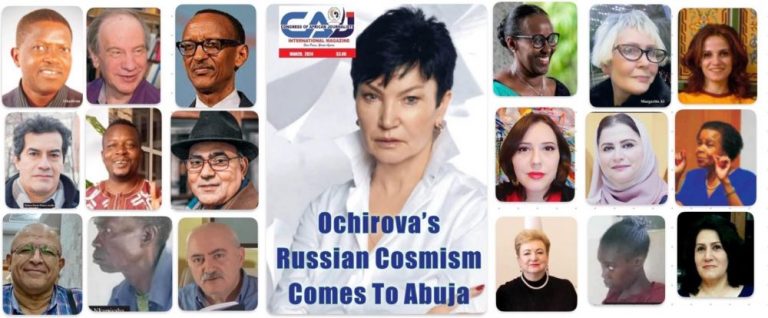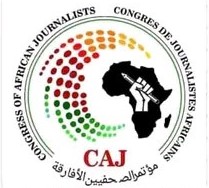
Association of Nigerian Authors will be hosting the writers of the world in the Abuja city of Nigeria, from April 4 to 6.
The CAJ International Magazine Welcomes World Writers
Abuja Correspondent
“The Association of Nigerian Authors (ANA) will be hosting the writers of the world “World Organization of Writers” in the Abuja city of Nigeria, from April 4 to 6. Congress of African Journalists (CAJ) in the spirit of camaraderie wishes the global writers a successful event and extending a warm welcome in advance.”
This was the new editorial by Michael Adeboboye, Editor-in-Chief of the CAJ International Magazine, March 2024: “We are in the International Media Cooperation Protocol (IMCP), with WOW, hence the decision to dedicate this March Edition for the literary icons works – OUR FRIENDS! Indeed, this edition focuses more on some literary works: book reviews, and many other stories across Africa. Apparently, our friends will have some African stories to accompanying them back home to their respective continents. Of course great book reviews are not in short supply in this edition, and all are no doubt irresistible brides well dressed for the glimpse of finest grooms. This sounds more of robust conviction of great, fascinating and stupendous disposition of literary works. “
 At the WOW first Congress, the book of Alexandra Ochirova will be introduced to the world in the capital city of the notable black nation of a notable continent. That is hypnotic enough to our cover “Alexandra Ochirova’s Russian Cosmism Comes to Abuja” The book was reviewed by Ashraf Aboul-Yazid Dali, founding member CAJ, President, Asia Journalists Association (AJA), Editor in Chief, The Silk Road Literature, Editor in Chief, The AsiaN and Deputy Editor in Chief, CAJ International Magazine.
At the WOW first Congress, the book of Alexandra Ochirova will be introduced to the world in the capital city of the notable black nation of a notable continent. That is hypnotic enough to our cover “Alexandra Ochirova’s Russian Cosmism Comes to Abuja” The book was reviewed by Ashraf Aboul-Yazid Dali, founding member CAJ, President, Asia Journalists Association (AJA), Editor in Chief, The Silk Road Literature, Editor in Chief, The AsiaN and Deputy Editor in Chief, CAJ International Magazine.
According to Dali, Russian Cosmism by Alexandra Ochirova is a unique literary work that combines profound philosophy with sublime poetry. “This book contains poems reflecting the author’s journey from her early works to the present, demonstrating the fullness and diversity of Alexandra Ochirova’s creativity.
Alexandra Vasilievana Ochirova is a Poet, Doctor of Philosophy, Academician of the Russian Academy of Arts, UNESCO Goodwill Ambassador, and Co-Chair of the General Council of the Assembly of Peoples of Eurasia, she holds a prominent place in contemporary culture and philosophy. Her multifaceted contribution to literature, science, and society is expressed through two key authorial aspects: Preservation of Humanity and Civilization of Meaning.
Alexandra Ochirova is a well-known political and public figure, recipient of state, public, and literary awards. She is the author of 15 poetry books, translated into the languages of the peoples of Russia and the world. Her lyrical legacy has inspired the creation of over a hundred musical compositions” writes Dali.
The role of public diplomacy in the development of Azerbaijani-Russian relations has been observed by poet and translator Eldar Akhadov, who has both identities.
On the other hand, four travels have been made to Zanzibar, Morocco, Cameroon and Tunisia. In the first topic, Egyptian writer and TV director Fatema al Zahraa Hassan highlights Dr. Badriya Al Shehhi’s work on Omani ruling of the African coastal sultanate of Zanzibar: “I found in the novel (Crossing Embers) a model of women’s quest for liberation and the rejection of outdated restrictions and the male view of life. Her revolution against injustice was parallel to the revolution of the African peoples occupied by the Islamized Muslim Arabs who were oppressing them and trading in slaves. There is no freedom without a price. No matter how great it is and how far-fetched it seems. The novel has been recently translated into English.”
 The author Al Shehhi is the first Omani woman to write the novel in its artistic and literal sense. Indeed, we can say that the novel (Crossing Embers) is the first Omani work of fiction in the professional literary sense.
The author Al Shehhi is the first Omani woman to write the novel in its artistic and literal sense. Indeed, we can say that the novel (Crossing Embers) is the first Omani work of fiction in the professional literary sense.
The second visit, to Morocco, is a chapter of Dr. Wale Okediran’s new book (Travels of a Troubadour): “Never in my life have I observed anything more bizarre than the first sight of Tangier. It is a tale out of the Arabian Nights… A prodigious mix of races and costumes. This whole world moves about with an activity that seems feverish. Eugène Delacroix, in a letter to Alexis de Tocqueville It’s midday in Tangier, Morocco. I am standing at the Tanja Marina Bay, Morocco’s first urban marina gazing into the blue waters of the Mediterranean as its freezing breeze carry to me, historic smells and sounds of this ancient and historical land. And despite the slanting midday sun, the cold weather persists. Far in the distance, lies Spain, separated from Tangier by a mere 20 miles of the Strait of Gibraltar. On a clear day, am told, one can see the whitewashed Spanish town of Tarifa, just 45 minutes away by ferry. In addition, the north Moroccan coast is less than 10 miles from some Spanish holiday beaches. It is Spain’s proximity to Tangier that has made the country a popular target of many African migrants, Nigerians inclusive, eager to escape to Europe.”
The third visit has been written by Ekowe Limunga Clarisse, who investigated Unveiling The Folklore Of “IHVARZA MOTE” Of Mountain Fako. And finally from Tunisia, Khaled Suleiman pays a visit to Kef castle and the historical city to showcase its festival.
New poems are published for two world poetesses, Dr. Ana Stjelja, Serbia and Elmaya Cabbarova, Azerbaijan.
The cultural section is concluded by a special interview by Michael Adeboboye on the latest book of Ashraf Aboul-Yazid, the poetry anthology of his poems 1989 – 2024.
Nigeria’s Economic Tightrope: ‘Dollarization’, Inflation and the Social Balancing, by Oseni Yusuf Salami, is a deep analysis of economy. While it’s about Nigeria, it seems that it is applicable to many African countries, as well.
Populous nation, walks a tightrope when it comes to economic policy. Two key issues, dollarization and inflation, intertwine in a complex dance that impacts not just financial markets but also the daily lives of millions. Understanding this interplay is crucial to analyzing the country’s present and predicting its future. Unofficial Dollarization: A Refuge or a Risk? Nigeria officially operates on the naira, but a phenomenon known as “unofficial dollarization” is prevalent. This refers to the widespread use of US dollars in everyday transactions, from rent payments to luxury goods purchases. Estimates suggest over 20% of deposits in Nigerian banks are in dollars, highlighting the significant presence of this parallel currency system.
The reasons for dollarization are diverse. Some view it as a hedge against inflation, which has historically been high in Nigeria (currently hovering around 13%). Others seek dollar stability for international transactions or simply perceive it as a more valuable store of wealth.
However, dollarization is not without its drawbacks. It reduces the Central Bank of Nigeria’s (CBN) control over monetary policy, making it harder to manage inflation and interest rates. Additionally, it can create a two-tiered economy, benefiting those with access to dollars while leaving others vulnerable to naira fluctuations.
Inflation has been a persistent challenge for Nigeria, often exceeding the CBN’s target range. This erodes purchasing power, disproportionately impacting low-income earners who spend a larger share of their income on essentials. The current global inflationary pressures exacerbate the situation, pushing up food and energy prices further. The government has implemented various policies to curb inflation, including raising interest rates and restricting money supply.
While these measures might achieve some stability, they can also dampen economic growth, creating a delicate balancing act. The interplay between dollarization and inflation has real-life consequences for Nigerians. High inflation reduces the value of wages and savings, making it difficult to afford basic necessities. This can lead to increased poverty, social unrest, and a decline in living standards.
Dollarization, while offering some stability for select groups, can exacerbate inequality. Those without access to dollars are exposed to the full brunt of naira fluctuations and inflation, further widening the socioeconomic gap. Addressing these challenges requires a multifaceted approach. Taming inflation remains crucial, and achieving this necessitates fiscal discipline, structural reforms to boost productivity, and targeted social safety nets to protect vulnerable populations. Combating unofficial dollarization requires building confidence in the naira through sustained economic stability and addressing the factors driving people towards foreign currencies. This could involve diversifying the economy, promoting financial inclusion, and strengthening the CBN’s monetary policy tools.
Also to read: Barriers Accessing MHC Results in Stillbirth, Traditional Leaders Call For Construction Of Health Centers In Villages, by Alice Chisanga, Sowing Seeds Of Compassion In Ghana, by Dela Ahiawor, Over 1500 Remains Of Victims To Be Given a Decent Burial in 2024, by Sabiiti Daniel, Medicine Control Agency Reinforces Ban on Skin Bleaching Products, by Kebba Ansu Manneh, and finally, “May 29: Democracy Day for South Africa”, by Donald Tlaka.
Published under the International Cooperation Protocol with The AsiaN (Arabic) Seoul, South Korea
____________________